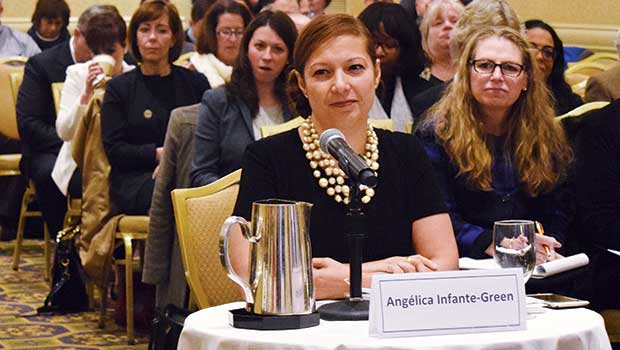Ed. board picks Mass. veteran
Lawrence supt. with turn-over experience impresses the board

The Massachusetts Board of Elementary and Secondary Education recommended Jeff Riley, Lawrence public school superintendent, as the state’s next education commissioner in an 8-to-3 vote on Monday. Education Secretary James Peyser will make the final decision.
The 11-member board deliberated between three finalists who were interviewed in public on Friday at the Omni Parker House in Boston: Riley; Angelica Infante-Green, deputy commissioner of the Office of Instructional Support P-12 in the New York State Education Department; and Penny Schwinn, chief deputy commissioner of academics at the Texas Education Agency.
Riley was the most familiar to the board, having served as superintendent in Lawrence for the past six years, and was credited by Peyser himself with leading one of the most successful district-level turnarounds in the state. He was also director of the High Tech Academy within Madison Park Technical Vocational High School, and from 2007 to 2009 was principal of the Edwards Middle School in Boston.
As the last candidate to be interviewed on Friday, Riley was asked whether he would change how teachers are evaluated by the state by looking at the standardized test scores of their students. He replied, “I’m not sure we have come to universal agreement on what quality instruction looks like.”
During his time in Lawrence, Riley removed automatic pay raises for teachers, lengthened the school day and decentralized power by giving principals more freedom to run their schools. He also increased enrichment programs, such as arts and sports.
Perhaps most controversial was that he turned management in seven of the worst-performing schools in Lawrence to charter schools and fired more than half of the district’s principals during his first year.
In the end however, Lawrence High’s dropout rate was cut in half. Before the takeover, the school’s dropout rate was 8.6 percent. In 2016, it was 4.2 percent. Four-year graduation rates rose from 52 percent in 2011 to 72 percent in 2016, and the percentage of students proficient in English in the MCAS increased from 41 percent to 51 from 2011 to 2016.
Women candidates
Infante-Green from New York was also a promising candidate, having garnered endorsement and support from Latino educators and organizations such as Inquilinos Boricuas en Acción. As the daughter of Dominican immigrants, she was heralded for her work in expanding bilingual and dual-language education for English Language Learners in New York City and for creating the first dual-language autism program in New York.
During her public interview with the board, Infante-Green said she would not answer questions using jargon because “I want parents and everyone listening to understand.” She also coined the term “differently-abled” in lieu of the word “disabled.”
Before candidate Penny Schwinn became deputy commissioner of academics in Texas, she served as assistant secretary for the Delaware Department of Education, and before that as assistant superintendent for the Sacramento, California school district. In Sacramento, she created the county’s first accountability system, Guide to Success, and founded Capitol Collegiate Academy, a charter school serving low-income students.
Her record of moving from one place to another was seen as a possible impediment in her candidacy, as was her recent involvement in awarding a no-bid contract to a private firm to collect data on special education students in Texas.
She was questioned about this during her public interview. “I was charged with writing a recommendation letter for a sole-source contract. I did so,” she said. “We did not bring in many of our parent advocacy groups and that was a mistake. Those parents should have been at the table making the decision.”
The Boston Women Leaders Network sent a letter to Baker in December urging him to select a woman as the next commissioner, a position that has yet to be held by one.
Compassion, communication sought
At the Omni Parker House on Friday, Rodolfo Aguilar, a member of Massachusetts Parents United, spoke to the Banner about which values he believes the next commissioner should embody.
“We’re looking for someone with compassion. Someone who understands that each community has its own struggle,” he said. “As well as someone who knows the challenges ahead in terms of closing the achievement gap.”
Gail Deegan, a former teacher and retired business executive said the next commissioner should communicate well, something she saw in Infante-Green’s interview, during which the candidate made light-hearted jokes with the board. “She had a real conversation with the board, which is indicative of her performance,” said Deegan. “It was important to see how she worked with the board, and I saw that these are people that can work together, have open exchanges.”


![Banner [Virtual] Art Gallery](https://baystatebanner.com/wp-content/uploads/2024/04/Cagen-Luse_Men-at-store-e1713991226112-150x150.jpg)



